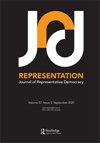从微型公众到大众公众的特刊介绍
Q2 Social Sciences
引用次数: 0
摘要
摘要近年来,协商民主的实验激增,主要关注小型公众等创新的内部运作和吞吐量合法性。关于这种小型公众和公众之间联系的研究仍处于初级阶段,围绕将小规模审议的结果扩大到公众的合法性,存在着激烈的争论。本特刊主要从两个广泛的角度讨论合法性问题;输入和输出的合法性,而一些论文也提供了吞吐量合法性的见解。投入是指从人口、态度和交叉角度来看参与者的代表性。产出是指小型公共产出是否反映了广大选民的想法,以及代表和决策者如何处理他们的产出。本文对参与者在小公众中的代表性、政治家的潜在参与以及整个过程中的问题以及公民如何看待小公众的合法性进行了理论和实证讨论。分析还侧重于参与者的态度一致及其重要性问题,而其他论文则通过考虑决策者的偏好在整个审议过程中的作用,来研究小型公众对更广泛选民的影响。本期特刊的理论贡献分析了这些民主创新对我们理解民主和前进道路的理论意义。本文章由计算机程序翻译,如有差异,请以英文原文为准。
Introduction to the Special Issue From Mini-publics to Mass Publics
ABSTRACT Recent years have seen a proliferation of experiments in deliberative democracy, with much focus on the internal workings and throughput legitimacy of such innovations as mini-publics. The research on the links between such mini-publics and the public is still in its infancy and there is a strong debate around the legitimacy of extending the outcomes of small-scale deliberation to the public. This Special Issue addresses the questions of legitimacy mainly from two broad perspectives; the input and the output legitimacy while some papers provide insights on throughput legitimacy as well. Input refers to the representativeness of participants from demographic, attitudinal and intersectional points of view. Output refers to whether the mini-public outputs reflect what the broader electorate would think and how representatives and policymakers deal with their outputs. The papers provide both theoretical and empirical discussion on participants' representativeness in mini-publics and politicians' potential involvement as well as issues of the whole process and how citizens perceive the legitimacy of mini-publics. Analysis also focuses on issues of attitudinal congruence of participants and its importance while other papers examine the impact of mini-publics to the wider electorate by also considering the role the preferences of policymakers have in the whole deliberative process. Theoretical contributions in this special issue analyze the theoretical implications of these democratic innovations for our understanding of democracy and the way forward.
求助全文
通过发布文献求助,成功后即可免费获取论文全文。
去求助
来源期刊

Representation
Social Sciences-Sociology and Political Science
CiteScore
3.50
自引率
0.00%
发文量
31
期刊介绍:
This change in scope follows two paths. Firstly, it seeks contributors who are interested in exploring the interface between democratic practice and theory. In particular, this focus seeks contributions that apply theoretical insights to actual examples of current practice. Secondly, while not neglecting the current focus of the journal, we would like to expand its international coverage so that the journal will offer our readers insights in the state of democracy worldwide.
 求助内容:
求助内容: 应助结果提醒方式:
应助结果提醒方式:


